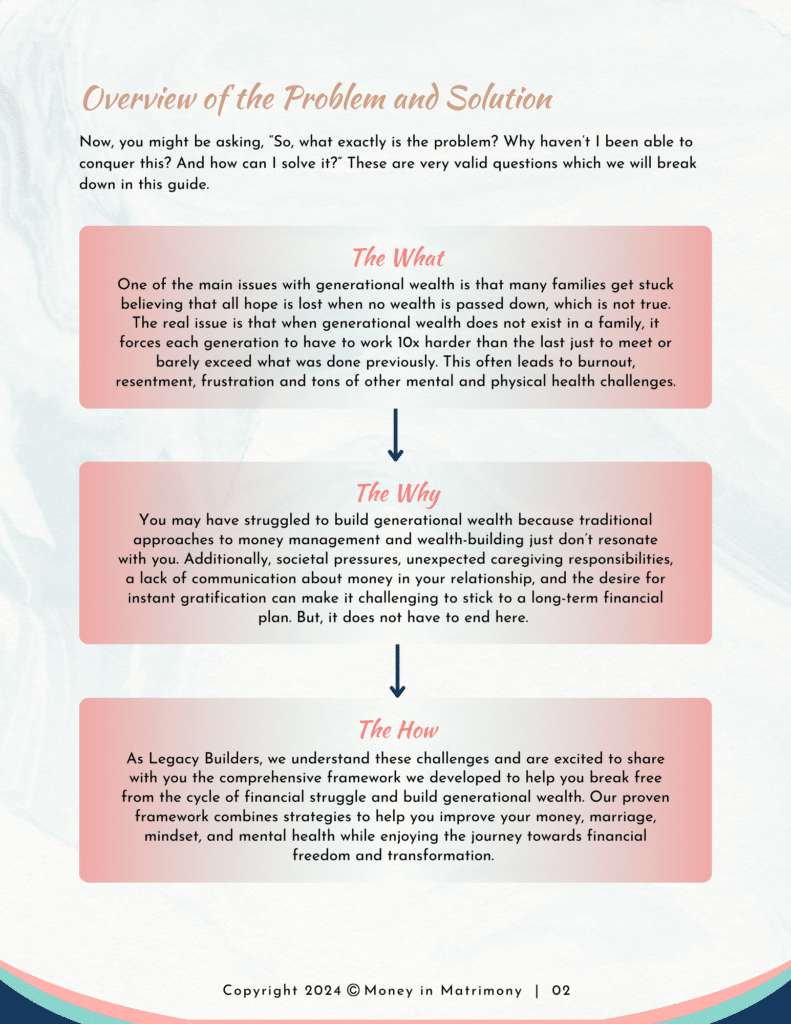4 of the Best Reasons Married Couples Should Share Finances
This post may contain affiliate links which means that I will receive a small commission for purchases made through those links, at no cost to you.

Should Married Couples Share Finances?
Since I’ve gotten this question a few times recently, I thought it would be a great idea to discuss my thoughts on why married couples should share finances. There are varying views on the topic, but you have to decide what works best for you and your family.
I did some research and discovered that there are more than a few married couples who do not share finances. According to a TD Bank Survey, roughly 25 percent of married couples do not share finances. However; I believe that when you marry, you join together as ONE. So why share a home, a bed, kids, but not finances? Below are 4 reasons why I believe that married couples should share finances:
- Save time on budgeting
- Build transparency and trust
- Allow both partners access to accounts
- Create a sense of family devotion
Now, let’s look into each of these as I break them down into more detail.
4 Reasons Why Married Couples Should Share Finances

1. Save time on budgeting
If you are lucky, then both you and your spouse are nerds and enjoy handling the finances within your household. However; for most people like me, one spouse loves handling the finances, while the other spouse only wants to know how much fun money is in this month’s budget! I guess it’s true when they say that opposites attract. Regardless of which category you fall into, either one or both spouses are involved in managing the household budget.
As the nerd in my own household, I learned early on the importance of combining finances with my hubby. The first concept I learned was that it saved me so much time when trying to track our spending. It also helped me to determine which bills were still outstanding since initially, we did not have automatic bill pay set up.
As I took on new roles in Corporate America, I was working anywhere from 50-70 hours per week. During busy season, which lasted for several months, I worked 80+ hours. There is no way that during those time periods I would have wanted to take time to balance multiple accounts. It was so much easier checking one bank account to track our spending and bill payments.
2. Build transparency and trust
Now here’s a big one! Maybe I should have listed this one first. Utilizing a joint account to take care of bills and other household expenses helps to build transparency and trust within your marriage. This is because both partners are allowed to see every aspect of what’s going on with the finances. This doesn’t mean that everything will be perfect surrounding your finances; however; having transparency and trust is an excellent way to begin building healthy financial habits within your marriage. This is also especially important because money issues are still one of the leading causes of divorce. If you and your spouse can master this area, then you will have a fighting chance at a long-lasting marriage (of course other circumstances must still be considered).
3. Allow both partners access to accounts
I have told this to my hubby on a number of occasions. Sometimes, he just doesn’t want any parts of the monthly budget conversations. However; I always have to explain to him that God forbid anything to happen to one of us, we both need to know how to access EVERYTHING as it relates to our household and our finances. It’s especially important now since we have a toddler running around who is depending on us to take care of her.
When I say EVERYTHING, this would include passwords, account numbers, payee names, and phone numbers, medical records, etc. I can’t tell you how many horror stories I’ve heard about, in which, one spouse took care of all the finances. Then, when that spouse suddenly became ill or passed away, the living spouse was left with a mess because he/she had no access to the accounts or they did not know other vital information.
A while back, I created The Ultimate Emergency Financial Checklist. This is a good resource to help you gather important documents for members of your household. You can find it here: The Ultimate Emergency Financial Checklist.
4. Create a sense of family devotion
I believe that sharing finances within marriage equates to family devotion. When finances are shared within marriage, it shows that family is important. If we operated using separate accounts in my household, there are just certain expenses I just would have no idea on how to separate. For instance, determining the following would be somewhat of a challenge:
- Which spouse purchases clothes or toiletries for the kids?
- Who pays for the monthly family night out?
- Do both spouses pay for small household emergencies?
I’m sure that there are many people who would probably be able to answer the questions above because they have a system in place. However; this method just wouldn’t work in my household.

Let me tell you a story
In February of 2018, I took a 12-week UNPAID maternity leave and my hubby took a 3-week UNPAID paternity leave to help me out since we both became new parents. My company is small and didn’t offer short-term disability insurance; so there goes that. However; I did have 10 PTO days that I stretched across the 12-week period. So basically, that’s less than 1 day of pay per week. Anyway; we knew that things would be tight, but the goal was to not touch the savings account unless we absolutely had to. So, we kept expenses low, and any additional spending in check as best we could. Needless to say, we did not have to touch the savings account to cover any regular household expenses.
After the hubby returned to work, he started bringing lunch from home to save money and he became a little bit more involved with the finances, as he knew I was exhausted from taking care of the baby full-time. He even asked if I wanted him to pick up an extra sport at school to earn a little extra cash. Now, I don’t know if he wanted to pick up coaching an extra sport so that he could have an excuse to get away from the crying baby or if he really wanted to help us stay ahead with our finances. For purposes of this post, I’m going to believe that it was the latter. lol
If our finances were not combined during my maternity leave, I don’t see how I would have been able to take care of any of our household bills, especially considering the fact that I was only bringing home less than an 8-hour check every week. Knowing that my hubby had my back made me feel secure. It reinforced my belief that family was a priority to him and it also re-confirmed that I, along with our new baby was important to him.
Develop Healthy Financial Habits
If you and your spouse develop healthy financial habits early on, several financial issues can certainly be eliminated; therefore; causing fewer arguments and stress about money. You and your spouse have to decide what works best for your household. Communication is key. However; if you are still finding that you and your spouse are having challenges communicating about money, then go ahead and grab this free resource which is designed to help you and your spouse get on the same page with money.
How TO Decide Who Pays Which Bills
Determining who takes care of which expenses can seem like a daunting task if there is no system in place to do so. If you and your spouse were utilizing a joint account, at a minimum, to pay household bills then this would eliminate the need to determine which spouse pays a certain bill. This is because you would both be throwing your money into the gumbo pot and both of you would be paying bills together as one unit. I encourage you to take some time to evaluate the current method being used in your household. Maybe it’s time for a change.
I do recognize that there are numerous opinions on this topic. Ultimately, you and your spouse are the only people who will fully understand the dynamic of your household. Together, you have to decide what the best method is for your family. If you don’t trust your spouse with access to a joint account because they have a gambling addiction, then sharing finances might not be the best method for your household. However; if you have full trust in your spouse and believe that sharing finances might actually help your marriage grow, then, by all means, try it out and see what happens.








